|
TRANSLATE THIS ARTICLE
Integral World: Exploring Theories of Everything
An independent forum for a critical discussion of the integral philosophy of Ken Wilber
 Ray Harris is a frequent contributor to this website. He has written articles on 9/11, boomeritis, the Iraq war and Third Way politics. Since 2007 he took to writing his novels Navaratri, Wild Child and Eden. Harris lives in Ballarat, Victoria, Australia. Ray Harris is a frequent contributor to this website. He has written articles on 9/11, boomeritis, the Iraq war and Third Way politics. Since 2007 he took to writing his novels Navaratri, Wild Child and Eden. Harris lives in Ballarat, Victoria, Australia.The Struggle Against ModernityThe Chinese and Russian Retreat to TraditionalismRay HarrisThe recently released TV series 'The Three Body Problem' (based on the novel by Liu Cixin) begins with a struggle session during the Cultural Revolution in which a professor is accused of supporting the reactionary theoretical physics of the 'imperialist dog' Albert Einstein. The professor refuses to recant and is beaten to death. This sequence is based on actual events. Absurd as it seems, a hardline faction (headed by Chen Boda) really did claim that the theory of relativity contradicted dialectical materialism.
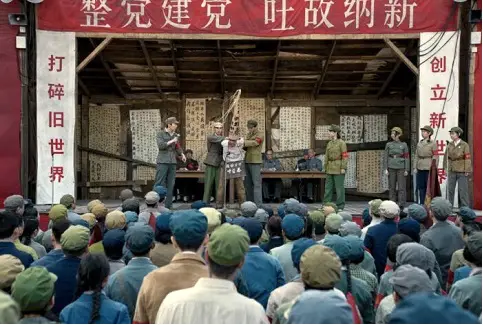 Fortunately wiser voices intervened and Chen Boda was purged. The CCP now embraces the theoretical physics advanced by a bunch of bourgeois, reactionary European intellectuals. China has now prioritised the development of quantum computing. This points to a major contradiction in the West versus the Rest argument. The 'Rest' have openly embraced key aspects of the modernist revolution whilst rejecting others. The Enlightenment inspired both the scientific and industrial revolutions as well as the intellectual and political revolution that ended feudalism, a revolution that splintered into three broad trends: liberal democracy, fascism and socialism. These three modernist political movements have had an enormous impact on the Rest. Of course, there is resistance to these modernist movements, particularly in the Muslim world where some countries hold onto traditional forms of government, either through some form of monarchy/caliphate or theocracy. I cannot think of a modern political theory that has been developed outside the West. The Rest seems to only argue for the continuation of traditional structures or for hybrid forms that integrate selected aspects of modernism. The issue is power. The Rest accepts Western technology and science so long as it doesn't threaten the traditional elites. The Enlightenment values of free speech and artistic expression, freedom of political and religious association and individual self-determination are rejected because they pose a threat to the established order. Perhaps it is worth remembering what life was like in traditional feudal systems where your role in life was determined by a rigid social structure? The communist revolutions that shook Russia and China were modernist revolutions violently opposed to the traditional feudal systems of both countries. Both of those revolutions ultimately failed. The Maoist experiment ended with his death in 1976 and the Soviet system collapsed in 1991. This caused an ideological crisis with both countries constructing new nationalist narratives. In order to do so both of these countries have returned to traditionalist thought. Xi Jinping and ConfuciusMao was resolutely opposed to what he regarded as the feudal philosophies and beliefs of the past (the Four Olds). In 1973 he launched an official campaign against the thought of Confucius and Confucianism. An article in the official party organ 'The Peking Review' says this. “Both at home and abroad, the reactionaries and the ringleaders of various opportunist lines have been worshippers of Confucius. Chairman Mao has repeatedly criticized Confucianism and the reactionary ideas of exalting Confucianism and opposing the Legalist school in the course of half a century in leading the Chinese revolution and struggling against reactionaries at home and abroad and against opportunist lines.” (1) The accusation against Confucius was that he was an apologist for the oppressive feudal system. It is perhaps worth revisiting what imperial China was like. 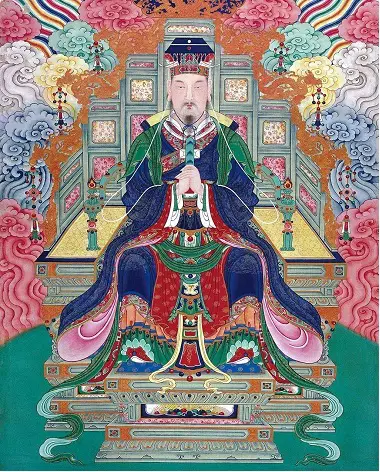
In its condemnation of Confucianism , the CCP declared that: “Confucius and Mencius dished up a reactionary programme for restoring the slave system—“restrain oneself and restore the rites.” Confucius said: “Once self-restraint and restoration of the rites are achieved, all under heaven will submit to benevolence,” ” “Confucius and Mencius held that “only the highest, who are wise, and the lowest, who are stupid, cannot be changed.” “Confucius and Mencius advocated the fallacy that “those who labour with their minds govern others; those who labour with their strength are governed by others.” (2) It is curious indeed, given this history, that the current chairman Xi Jinping has attempted to restore the reputation of Confucius. It is not difficult to understand why. Confucianism is an ethical philosophy in which obedience and conformity are considered virtues. Perfect for an authoritarian state. “Confucian thought focuses on the cultivation of virtue in a morally organised world. Some of the basic Confucian ethical concepts and practices include ren, yi, li and zhi. Ren is the essence of the human being which manifests as compassion. It is the virtue-form of Heaven. Yi is the upholding of righteousness and the moral disposition to do good. Li is a system of ritual norms and propriety that determines how a person should properly act in everyday life in harmony with the law of Heaven. Zhi is the ability to see what is right and fair, or the converse, in the behaviours exhibited by others.” (3) Some like to imagine that Confucianism is uniquely Chinese (Asian). It isn't. There are correlates in most civilisational complexes. In India the concept of dharma outlines virtuous behaviour in the rigid caste system. And both Roman and Orthodox Christianity urged followers to accept their position in a divinely ordained feudal order. Know your place and accept your fate. Do not question the Mandate of Heaven. I'm not arguing for a reductionist view of Confucianism. It is a living ethical system that has reinvented itself in response to challenges from outside: to Buddhism, to European thought, to the Modernist political systems of capitalism and socialism. “Joining this conversation about the role and status of Confucianism in contemporary China, Wen Yu introduced three diverse groups of thinkers in China today whose different interpretations of Confucian learning have deeper roots in China's debates on nation-building since the late 19th century. They are the Cultural Liberals, Confucian Socialists, and Institutional Confucians.” (4) It would seem that Xi Jinping has turned to the Confucian Socialist camp, defined thus: “The camp of Confucian Socialism surfaced later, amid the New Left movement, exhibiting a strong inclination toward a populist interpretation of Confucianism. This group champions a distinct Chinese modernity characterized by social equality and a robust collective identity, endorsing a centralized, meritocratic government as the solution to equality while rejecting Western parliamentary democracy and global capitalism.” (5) At this point I want to raise the issue of the condemnation of Western individualism typical of both Chinese and Russian polemic. There is a contradiction at play here. China actually has a tradition of individualism in the Daoist hermit or mountain sage (male and female). These were individuals who stepped outside of the feudal system to pursue of life of contemplation and shamanic practice. There are interesting parallels with the iconoclastic Tantric tradition of India, which intentionally challenged the orthodox caste system. Daoists have also been implicated in several rebellions against the elites, most notably the Yellow Scarf rebellion in 184 CE and the 'Way of the Five Pecks of Rice' movement in 191 CE, which established a short-lived independent Daoist state. The even more glaring contradiction is that Confucius himself is an example of a strong individual establishing a new philosophy. Such wise elders (or immortals) are venerated in Chinese society. But I digress, Xi Jinping has not invoked the Daoists. He prefers a philosophy that sees obedience as a virtue. According to China Daily, the official organ of the Central Propaganda Department of the CCP. "Culture is the soul of a nation," Xi told hundreds of participants from home and abroad at the opening of an international conference to commemorate the 2,565th anniversary of Confucius' birth, which fall [s] on Sunday. If a country does not cherish its own thinking and culture, if its people lose their soul, no matter which country or which nation, it will not be able to stand." Observers said the new leadership's endorsement of traditional culture has reached an unprecedented level since the establishment of New China in 1949, and Confucianism, the doctrine of the much-revered thinker, obviously resonates with Chinese today.” (6) In October, 2023, the state controlled Hunan TV aired, with Xi's blessing, the comical propaganda program, 'When Marx Met Confucius'.
当马克思遇见孔夫子, When Marx Met Confucius,
Uncle Hô
The video stretches credulity. Both Marx and Confucius's views are distorted to suggest compatibility where there is none. Mao would be turning in his grave. Vladimir Putin and Ivan IlyinIf Xi's rehabilitation of Confucius seems strange, what then to make of Putin's rehabilitation of Ivan Ilyin and General Anton Denikin, the leaders of the White counterrevolution that attempted to overthrow the Bolsheviks? In 2008 he arranged for Ilyin's remains to be repatriated from Germany to be reburied in the cemetery of the Donskoy Monastery in Moscow (next to Denikin). He paid for the graves personally and visited them at their consecration in May, 2009, an event published on the official Kremlin website. (7) 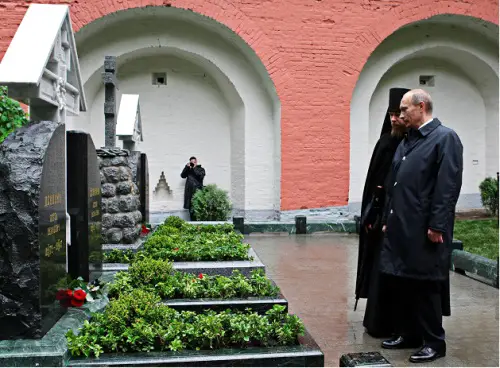 Earlier, in 2005, he invoked Ilyin in his address to the Federal Assembly, calling him 'the great Russian philosopher'. (8) To rehabilitate Ilyin, the enemy of the Russian revolution, is a clear repudiation of communism. Like Confucius in Mao's China, Ilyin's writing had been banned and mention of him was outlawed. Putin encountered Ilyin's writing whilst he was a KGB operative stationed in Germany where had access to forbidden material. “You know, I don't want to say that it was only Ivan Ilyin,” Putin told a 2021 political forum in response to a question about the thinkers who influenced him. “But I read Ilyin, I still do, from time to time. His book is on my shelf.” (9) So what is the attraction? The collapse of the Soviet system and the chaos that ensued during Yeltsin's attempts to reform the Russian economy lead to a crisis of confidence and identity. It is not difficult to imagine the cultural disorientation. What were Russians to believe now? As we have seen Putin has turned to the Orthodox Church and to past Eurasianist myths. Ilyin fits this new ideology perfectly. In 1934 Ilyin declared. “This idea should be state-historical, state-national, state-patriotic, state-religious. This idea should stem from the very fabric of Russian soul and Russian history, from its spiritual hunger. This idea should speak of the essence of Russians—both of the past and of the future—it should light the way for the generations of Russians to come, giving meaning to their lives and giving them vigor…” (10) Ilyin advocated for an authoritarian government with close links to the Orthodox Church. He believed in a unique Russian soul. But far more problematic was that Ilyin became an apologist for fascism, writing a now infamous pamphlet titled, 'On Russian Fascism'. “Fascism emerged as a reaction to Bolshevism, as a concentration of state-protective forces on the right. During the onset of leftist chaos and leftist totalitarianism, this was a healthy, necessary and inevitable phenomenon. This concentration will continue, even in the most democratic states: in the hour of national danger, the healthy forces of the people will always concentrate in the direction of security and dictatorship. So it was in ancient Rome, so it was in new Europe, and so it will continue to be.” (11) In an earlier article titled, 'National-socialism. The New Spirit', he said. “The spirit of the National Socialism is not limited to “racism”. It does not boil down to denial either. It puts forward positive and creative challenges. And these creative tasks are facing all peoples. Finding ways to solve these problems is imperative for all of us.” (12) And in case anyone is in doubt where his sympathies lay, in 'Letters on Fascism' he claimed that: “Mussolini has the gift of a political sculptor, the original, completing [the] daring of the Michelangelo tradition.” (13) Even more damning is this misguided assessment: “I refuse to judge the movement of German National Socialism by those excesses of the struggle, individual clashes or temporary exaggerations that are put forward and emphasized by its enemies. We advise you not to believe the propaganda trumpeting about the atrocities here.” (14) Atrocities that proved to be amongst the worst in history. Given this endorsement of fascism it seems even more alarming that Putin would have anything to do with Ilyin. Here is Putin quoting Ilyin in 2022 in his speech at the ceremony for the signing of the treaties establishing the Donetsk and Luhansk People's Republics and the Kherson and Zaporizhia Regions as part of the Russian Federation, an illegal annexation that has not been recognised by the UN. “And I want to end my speech with the words of a true patriot Ivan Alexandrovich Ilyin: “If I consider Russia my Motherland, then this means that I love in Russian, contemplate and think, sing and speak Russian; that I believe in the spiritual strength of the Russian people. His spirit is my spirit; his fate is my fate; his suffering is my grief; its flowering is my joy.” (15)
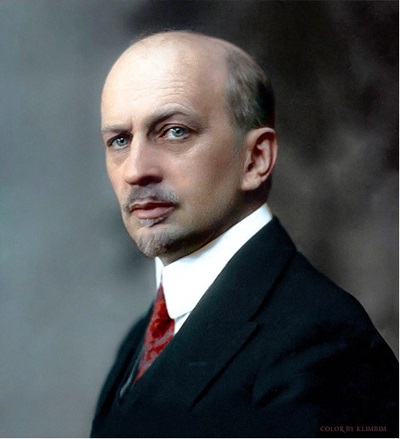
Ivan Ilyin
There are also strong echoes of Ilyin in Putin's speeches on Ukraine. Ilyin described Ukraine as 'Little Russia'. “Little Russia and Great Russia are bound together by faith, tribe, historical destiny, geographical location, economy, culture and politics…” (16) In his infamous speech justifying his illegal invasion of Ukraine, Putin declared: “Russians, Ukrainians, and Belarusians are all descendants of Ancient Rus, which was the largest state in Europe. Slavic and other tribes across the vast territory—from Ladoga, Novgorod, and Pskov to Kiev and Chernigov—were bound together by one language (which we now refer to as Old Russian), economic ties, the rule of the princes of the Rurik dynasty, and—after the baptism of Rus—the Orthodox faith.” (17) But Putin is not the only member of the ruling elite to endorse Ilyin. Former president Medvedev wrote the introduction to a reprint of Ilyin's writings (absent his writings on fascism - that would be too awkward). Lavrov has cited Ilyin: “The Russian philosopher Ivan Ilyin wrote that a healthy state and a healthy army are impossible without the sense of personal spiritual dignity. Without this basis Russia would not have risen to its ultimate destiny, and would not have created its great culture. (18) Patriarch Kirill (also a former KGB operative) described Ilyin as “the greatest thinker Russia has ever produced” (19). From pariah to greatest ever. Amazing. Ideology that serves the stateThe concept of a divinely mandated order is a universal characteristic of city-states. Some form of clerical/philosopher caste devise a hierarchical system that entrenches the power of the elites. The priests declare the ruler divine and the ruler maintains the divine order. Social harmony is achieved when every person accepts their preordained place. The people who carry the burden are the larger population of peasants, serfs, slaves, and especially women. The essence of modernism is the rejection of all such divinely mandated systems whether that be through some form of liberal democratic evolution or socialist revolution. Fascism was a reaction to modernism that retreated to ethno-religious exceptionalism: Hitler's myth of a superior Aryan race, Mussolini's glorification of Italy's Roman past or Franco/Salazar's Catholic Fascism. It is hardly surprising that under the pressure of globalisation ('Empire') some people retreat to such exceptionalist myths. This is not a left/right issue because some of the left have also reacted to the process of globalisation. The rise in identity politics can be seen as a way to forge new tribal groups against the homogenising forces of globalisation. The left embraces indigenous rights and calls for decolonisation (the deconstruction of globalisation). The right retreats to ethno-religious myths (and conspiracies) and creates the bogeyman of a sinister New World Order/Deep State. To understand this let us return to Maslow's hierarchy of needs. The function of the early city-state was to protect the population from external threat and natural disasters, especially famine. Early city-states engaged in extensive agricultural works, especially irrigation systems. Of course they built extravagant temples and palaces, but they also built dams, wells, canals and irrigated fields. Slavery provided the expendable work force and whilst the peasant class led simple lives, for the most part their basic needs were met and only disrupted by wars and natural disasters. This is where the system meets its major contradiction. Once the basic needs are met and the state provides security and stability for a long enough period, the higher needs of self-esteem and self-actualisation arise naturally, most notably within the upper-middle class. Confucius is a prime example. 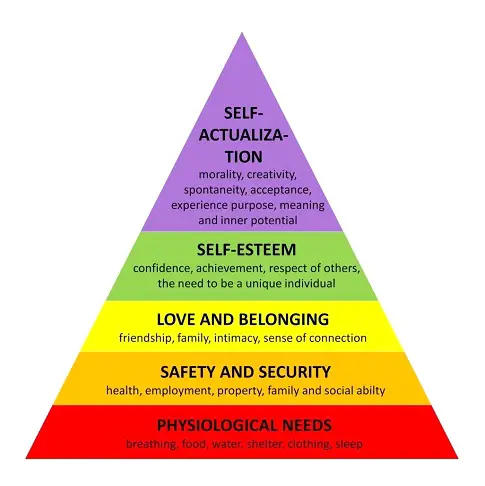 A new breed of philosopher begins to question the foundational assumptions of the social order. There is call for greater individual freedom to express the impulse to self-actualisation. Whilst the system might tolerate this to a certain extent, history points to the suppression of dissent, or in religious terms, heresy. This suppression can be quite vicious. This gives rise to a new tension between progress and the conservative demand to preserve tradition. It is clear that both Russia and China, once the champions of the revolutionary overthrow of the traditional order have now returned to authoritarianism supported by apologist ideology. In both Russia and China we see tight controls on freedom of expression and association. Dissent is not tolerated and ideological rivals are either imprisoned, exiled or killed. This has a suppressive effect on the hierarchy of needs, freezing the state at the 'belonging' stage and replacing love of humanity with patriotism. Given this it is disturbing to see some argue that Russia and China offer any kind of alternative.
It is clear that both Russia and China, once the champions of the revolutionary overthrow of the traditional order have now returned to authoritarianism supported by apologist ideology.
NOTESWhere possible I have avoided citing opinion, rather I have sought primary sources from official Chinese and Russian government websites. 1. 'Carry the Struggle to Criticize Lin Piao and Confucius to the End'. Peking Review. www.marxists.org 2. Peking Review. 3. "Confucianism", Wikipedia 4. "Negotiating the Gap: Communism and Confucianism", fairbank.fas.harvard.edu 5. "Negotiating the Gap: Communism and Confucianism", fairbank.fas.harvard.edu 6. 'Xi cites Confucius as a positive example for modern nation'. China Daily, www.chinadaily.com.cn 7. "Prime Minister Vladimir Putin visited the cemetery of the Donskoy Monastery", archive.government.ru 8. "Annual Address to the Federal Assembly of the Russian Federation", en.kremlin.ru 9. "Are Putin's views fascist?", www.aljazeera.com 10. "Ivan Ilyin: A Fashionable Fascist", ridl.io 11. I. Ilyin, 'On Russian Fascism' (1928). Many of Ilyin's books are out of print. The following quotes were sourced from Lyttenburgh's comment at "Postliberalism, or a 'conservatism for optimists'", irrussianality.wordpress.com 12. I.Ilyin, 'National Socialism. The New Spirit.' (Paris, 1933) Sourced Lyttenburgh. 13. I. Ilyin, 'Letters on Fascism'. Sourced Lyttenburgh. 14. I. Ilyin, 'On Russian Fascism' (1928). Sourced Lyttenburgh. 15. "Article by Vladimir Putin 'On the Historical Unity of Russians and Ukrainians'", en.kremlin.ru 17. "Article by Vladimir Putin 'On the Historical Unity of Russians and Ukrainians'", en.kremlin.ru 18. "Speech by the Russian Foreign Minister, Sergey Lavrov, at the protocol event on the occasion of Orthodox Easter, Moscow, 28 May 2014", www.mid.ru 19. "Putin's war is also Kirill's crusade", libmod.de
Comment Form is loading comments...
|